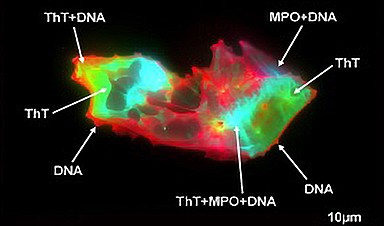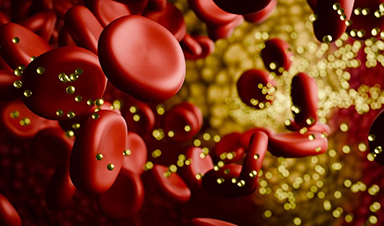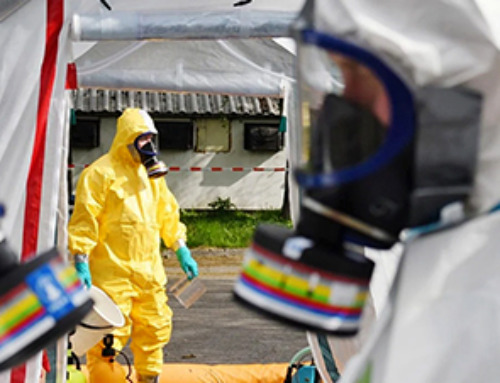Summary: Mainly associated with COVID infection in the elderly, researchers report a young, otherwise healthy woman was diagnosed with COVID-19 CNS vasculitis following infection.
Source: UCSD
Although COVID-19 is primarily treated as a respiratory disease, patients often experience neurological problems, such as headaches, anxiety, depression and cognitive issues, which can persist long after other symptoms have resolved.
Some research has shown blood vessel damage and inflammation referred to as vasculitis in COVID-19 patients’ brains and central nervous system (CNS). Most cases of CNS vasculitis have been associated with elderly patients with severe COVID-19, but in a report published July 28, 2021 in the journal Neurology: Neuroimmunology & Neuroinflammation, a multidisciplinary team of physicians at University of California San Diego School of Medicine describe the first known case of a young, healthy adult infected by the SARS-CoV-2 virus who also experienced CNS lymphocytic vasculitis.
The 26-year-old woman was diagnosed with COVID-19 four days after an airplane flight in mid-March 2020. Her symptoms were mild, but progressed two to three weeks later to difficulty moving her left foot and weakness on the left side of her body. She had no headaches and had experienced no change in her mental status or cognition.
Magnetic resonance imaging, however, revealed multiple lesions in the right frontoparietal region of the brain, which is involved in motor control and sensation of the left side of the body. A biopsy revealed CNS lymphocytic vasculitis — inflammation or swelling of blood vessels in the brain and spine.

The woman underwent a series of corticosteroid-based treatments, began a long-term immunosuppressive medication, and, after six months, the lesions had substantially decreased and no new lesions had formed. She is still under treatment with immunosuppressive medications.
“This patient was first confirmed case of COVID-19 CNS vasculitis, confirmed by biopsy, in a young healthy patient with otherwise mild COVID-19 infection,” said corresponding senior author Jennifer Graves, MD, PhD, a neurologist at UC San Diego Health and associate professor of neurosciences at UC San Diego School of Medicine.
News
Fever-Proof Bird Flu Variant Could Fuel the Next Pandemic
Bird flu viruses present a significant risk to humans because they can continue replicating at temperatures higher than a typical fever. Fever is one of the body’s main tools for slowing or stopping viral [...]
What could the future of nanoscience look like?
Society has a lot to thank for nanoscience. From improved health monitoring to reducing the size of electronics, scientists’ ability to delve deeper and better understand chemistry at the nanoscale has opened up numerous [...]
Scientists Melt Cancer’s Hidden “Power Hubs” and Stop Tumor Growth
Researchers discovered that in a rare kidney cancer, RNA builds droplet-like hubs that act as growth control centers inside tumor cells. By engineering a molecular switch to dissolve these hubs, they were able to halt cancer [...]
Platelet-inspired nanoparticles could improve treatment of inflammatory diseases
Scientists have developed platelet-inspired nanoparticles that deliver anti-inflammatory drugs directly to brain-computer interface implants, doubling their effectiveness. Scientists have found a way to improve the performance of brain-computer interface (BCI) electrodes by delivering anti-inflammatory drugs directly [...]
After 150 years, a new chapter in cancer therapy is finally beginning
For decades, researchers have been looking for ways to destroy cancer cells in a targeted manner without further weakening the body. But for many patients whose immune system is severely impaired by chemotherapy or radiation, [...]
Older chemical libraries show promise for fighting resistant strains of COVID-19 virus
SARS‑CoV‑2, the virus that causes COVID-19, continues to mutate, with some newer strains becoming less responsive to current antiviral treatments like Paxlovid. Now, University of California San Diego scientists and an international team of [...]
Lower doses of immunotherapy for skin cancer give better results, study suggests
According to a new study, lower doses of approved immunotherapy for malignant melanoma can give better results against tumors, while reducing side effects. This is reported by researchers at Karolinska Institutet in the Journal of the National [...]
Researchers highlight five pathways through which microplastics can harm the brain
Microplastics could be fueling neurodegenerative diseases like Alzheimer's and Parkinson's, with a new study highlighting five ways microplastics can trigger inflammation and damage in the brain. More than 57 million people live with dementia, [...]
Tiny Metal Nanodots Obliterate Cancer Cells While Largely Sparing Healthy Tissue
Scientists have developed tiny metal-oxide particles that push cancer cells past their stress limits while sparing healthy tissue. An international team led by RMIT University has developed tiny particles called nanodots, crafted from a metallic compound, [...]
Gold Nanoclusters Could Supercharge Quantum Computers
Researchers found that gold “super atoms” can behave like the atoms in top-tier quantum systems—only far easier to scale. These tiny clusters can be customized at the molecular level, offering a powerful, tunable foundation [...]
A single shot of HPV vaccine may be enough to fight cervical cancer, study finds
WASHINGTON -- A single HPV vaccination appears just as effective as two doses at preventing the viral infection that causes cervical cancer, researchers reported Wednesday. HPV, or human papillomavirus, is very common and spread [...]
New technique overcomes technological barrier in 3D brain imaging
Scientists at the Swiss Light Source SLS have succeeded in mapping a piece of brain tissue in 3D at unprecedented resolution using X-rays, non-destructively. The breakthrough overcomes a long-standing technological barrier that had limited [...]
Scientists Uncover Hidden Blood Pattern in Long COVID
Researchers found persistent microclot and NET structures in Long COVID blood that may explain long-lasting symptoms. Researchers examining Long COVID have identified a structural connection between circulating microclots and neutrophil extracellular traps (NETs). The [...]
This Cellular Trick Helps Cancer Spread, but Could Also Stop It
Groups of normal cbiells can sense far into their surroundings, helping explain cancer cell migration. Understanding this ability could lead to new ways to limit tumor spread. The tale of the princess and the [...]
New mRNA therapy targets drug-resistant pneumonia
Bacteria that multiply on surfaces are a major headache in health care when they gain a foothold on, for example, implants or in catheters. Researchers at Chalmers University of Technology in Sweden have found [...]
Current Heart Health Guidelines Are Failing To Catch a Deadly Genetic Killer
New research reveals that standard screening misses most people with a common inherited cholesterol disorder. A Mayo Clinic study reports that current genetic screening guidelines overlook most people who have familial hypercholesterolemia, an inherited disorder that [...]





















